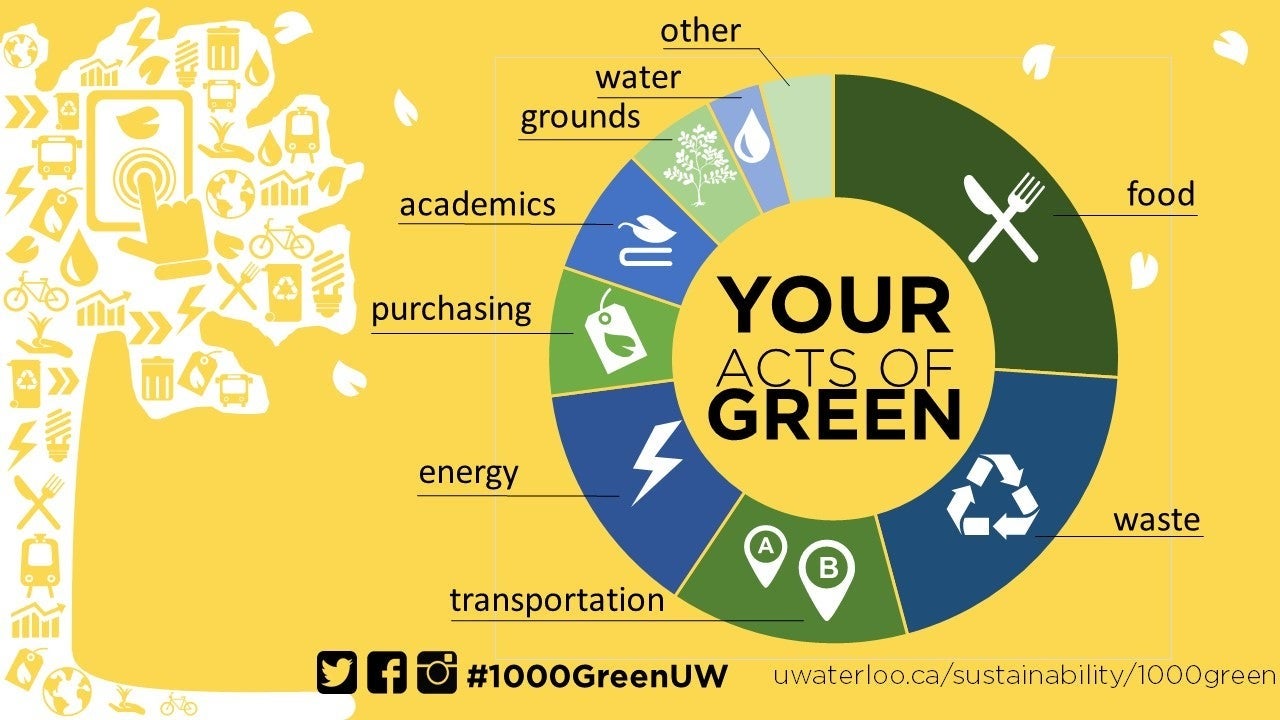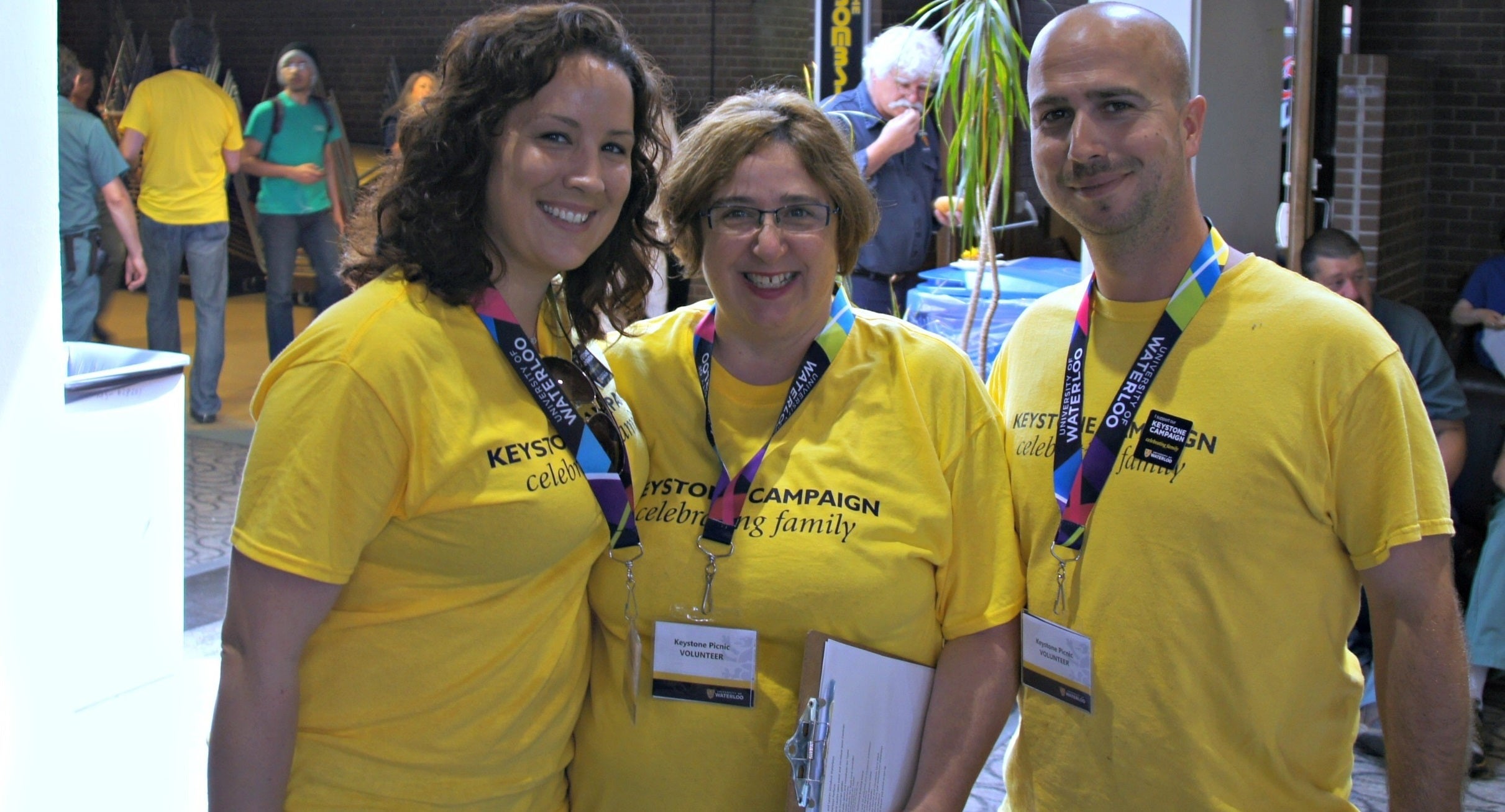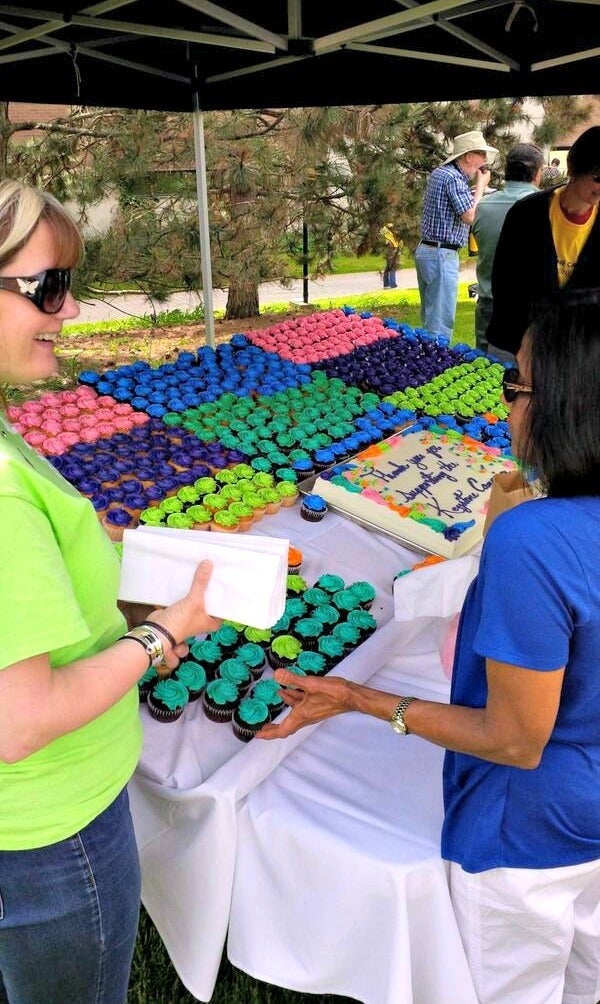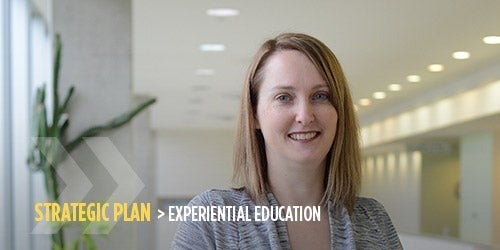Editor:
Brandon Sweet
University Communications
bulletin@uwaterloo.ca
#1000GreenUW surpasses 100 actions

A big thanks to those who have shared over 100 green actions across campus! There have been some creative food and waste actions, plus inspiring transportation and energy acts. With two more weeks to go until Earth Day, now is the time to showcase your support for everyday actions that make Waterloo a greener place.
So far, the Faculty of Environment has been leading the charge, but we’ve seen great actions from Engineering, Arts, Community Relations, the R&T Park, and Marketing and Undergraduate Recruitment. Keep the conversation going and growing!
Visit Waterloo's sustainability website to see what others are posting, see upcoming events, and to join the conversation.
Keystone campaign volunteers: giving to inspire giving
by Carrie Nickerson, Keystone Communication Committee Chair. This story is part of the #UWCommunity National Volunteer Week 2016 series, profiling volunteer-driven University of Waterloo initiatives that help make a difference in our community.

The Keystone Campaign offers the UWaterloo community an opportunity to engage in philanthropy right here on campus. Each year, 150 remarkable volunteers made up of faculty, staff and retirees share their time, ideas and enthusiasm to support Keystone. Their dedication helps to enhance the student experience and celebrate the incredible community that make up our UWaterloo family.
Through their hard work and giving spirit, Keystone volunteers play a huge part in securing funding for major Waterloo initiatives, including infrastructure improvements like the recent Health Services expansion, which was supported by funds raised through the Treat-a-gram program. Did you know that without Keystone volunteers there’d be no Treat-a-gram in February? This year, our volunteers hand delivered 3,900 cake pops with messages of gratitude and affection for friends and colleagues across our campuses. In fact, Treat-a-gram 2016 raised a whopping $13,346 for Waterloo’s new #HeForShe scholarships designed to support women in our STEM programs!

Without volunteers our annual June Picnic wouldn’t be possible. Each year the Keystone Campaign gathers hundreds of faculty, retirees and staff together in recognition of their contributions of time and financial support for our campus community. Keystone volunteers don’t just whip up the cotton candy, flip the burgers and man the dunk tank, they also spend months planning for the event.
Each November, in celebration of National Philanthropy Day, Keystone volunteers host a talk where a group of campus partners share the amazing ways they are donating their time for charitable organizations and projects around the world. Keystone has hosted some remarkable organizations such as Bringing About Better Understanding (BABU), Bridges to Prosperity (B2P) and the University of Waterloo Habitat for Humanity Build Team. This event is a great example of how Keystone volunteers celebrate giving and make our community and the world a better place!
In the time between Treat-a-gram, the picnic and National Philanthropy Day, Keystone volunteers stay busy brainstorming and executing communication strategies to promote Keystone to our campus partners and to recognize its generous contributors. They create videos and infographics; they write stories on Keystone events, donors, scholarship recipients and special projects: all to recognize the donations of our generous contributors and the impact that their giving has on our students.
To be a Keystone volunteer means exemplifying the spirit of giving. Each volunteer brings their individual enthusiasm, dedication, talent and expertise to the table for the betterment of UWaterloo as a whole.
Dedicated volunteers make these huge UWaterloo events not just possible, but awesome too. Our annual Staff Picnic is only a few months away. Get involved and join a remarkable group of doers by becoming a Keystone Volunteer!
From April 10 to 16, 2016, we invite you to join in the conversation by celebrating and recognizing individuals, groups, committees and clubs at Waterloo who actively make a difference through volunteering. Share your photos, comments, or words of thanks on Twitter and Instagram using #UWCommunity and #NVW2016.
WatCACE research drives co-op forward

This is the latest in a series of #UWStratPlan stories that profile some of the initiatives that are part of the robust efforts to implement the Strategic Plan.
With 19,000 work terms per year in 60 countries, the University of Waterloo might be inclined to put its co-operative education program on cruise control and let it roll along without a fuss.
That’s not the Waterloo way and WatCACE — the Waterloo Centre for the Advancement Co-operative Education is a prime example of that. WatCACE always has another question to ask, or trend to track, in its role as the research arm of Waterloo’s co-operative education program.
"When I put my WatCACE hat on, what’s important is not just that we are doing it big, but that we are doing it well," says Judene Pretti, the centre’s director.
The research that WatCACE oversees sharpens Waterloo’s edge in co-op. That, in turn, helps keep the University’s Strategic Plan commitment to provide students with optimal experiential education.
While Co-operative Education and Career Action runs a range of frontline services supporting co-op students and employers, WatCACE works in the background. It generates research, shares it and provides thought leadership in the field — on campus, and with institutions around the world where “work-integrated learning” (WIL) is part of getting a degree.
In 2015, WatCACE asked 2,000 Waterloo students about the things that deliver a satisfying, high-quality co-op experience. Feedback included whether they could make an impact, whether they could connect it to school or their future career plans and whether they felt they had the flexibility to take initiative.
"Loud and clear, the role of supervisor and the support provided is at the front of the list as far as what affects the quality of the student’s experience,” Pretti says.
That led to an online tool box for supervisors. It covers the four stages of a work term: pre-arrival, on-boarding, mid-term and final term. A second part of the study now under way switches perspective to get the views of supervisors.
WatCACE also sets up pilot projects to examine services that lead to successful placements. The GreenHouse Co-op pilot, introduced two years ago, returned in winter 2016 to help first-year students land hard-to-find work experiences with social-profit businesses.
Gender and Equity talk on the global land grab
The Special Advisor to the President on Women’s and Gender Issues and the FAUW Status of Women and Equity Committee have announced the next speakers in this year’s Gender and Equity Scholarship Series.
On Wednesday, April 13 from 11:30 a.m. to 1:00 p.m., Dr. Andrea Collins will present her work entitled "Gender, Land, and Global Governance: Governing Global Land Deals?"
Collins is Assistant Professor in the School of Environment, Resources and Sustainability at the University of Waterloo. Her research examines the role of gender in the governance of food, land, and agriculture in both local and global contexts. She has recently published her research in Globalizations and has a forthcoming article in the International Feminist Journal of Politics on empowerment discourses in global agricultural investment principles.
"The so-called “global land grab” has rightfully earned attention in academic circles. Large-scale land deals can displace and disrupt the farming practices of rural communities, undermining food security, and often leaving little legal recourse for rural populations. Consequently, international organizations such as the World Bank and the Food and Agriculture Organization of the United Nations (FAO) have developed global principles and guidelines designed to address just these issues," says the talk's abstract. "This presentation examines to what extent these initiatives have considered the role of gender in land governance. Rural women often play a critical role in food security, yet they face immense challenges to securing land. These global recommendations often overlook gendered hierarchies in land governance, tensions with recognizing customary land rights, and the immense costs and commitments required to change existing practices. Through examining the practices of land governance in Tanzania, this seminar highlights the obstacles to effective land reforms and offers a reexamination of global efforts to govern land."
The Gender and Equity Scholarship lecture series intends to assist not only with the promotion of gender and equity research currently being conducted at the University, but also with the creation of networking opportunities for equity minded faculty on campus. Light refreshments and desserts will be served at this event.
Science Undergraduate Office closure
The Science Undergrad Office (SUO) will be closed on Thursday (April 14) from 11:30am to 1pm, due to a staff lunch.
"We apologize for any inconvenience this may cause," says the official notice.
The SUO is located in STC 2031.
Check the SUO webpage for regular office hours. Don't forget to sign up for our drop-in hours!
Link of the day
International Day of Human Spaceflight
When and where
1000 Acts of Green campaign, Monday, March 28 to Friday, April 22.
Waterloo Discovery Day in Health Sciences, Tuesday, April 12, 8:00 a.m. to 3:15 p.m., various locations on campus.
WISE Public Lecture Series featuring Teresa Jiang, Uponor, “Insights and Considerations for PEX-a Energy and Plumbing Applications,” Wednesday, April 13, 10:30 a.m., CPH 4333. Register via Eventbrite.
Gender and Equity Scholarship Series featuring Dr. Andrea Collins, School of Environment, Resources, and Sustainability, “Gender, Land, and Global Governance: Governing Global Land Deals?” Wednesday, April 13, 11:30 a.m., MC 5501.
Watts Up – Home and Work Energy Savings Lunch and Learn event, Wednesday, April 13, 12:00 p.m., EV2 2006.
Staff International Experience Fund Brown Bag Lunch Session, Thursday, April 14, 12:00 p.m., DC 1301.
UW Retirees’ Association Spring Reception, Wednesday, April 13, 3:00 p.m., University Club.
Biomedical Discussion Group Lecture featuring Dr. Sara Mashid, “Nanostructured based Lab-on-chips for optical and electrical detection,” Thursday, April 14, 2:30 p.m., DC 1304.
Sustainable Waterloo Region Evening of Recognition, Thursday, April 14, 4:30 p.m., Bingemans Conference Centre.
California Pitch Alumni Event, Thursday, April 14, 7:00 p.m., Computer History Museum, Mountain View, CA.
2016 University of Waterloo Brain Bee, Saturday, April 16, 10:00 a.m., Sun Life Financial Auditorium, LHI 1621.
Waterloo Global Science Initiative presents Power Shift Waterloo Region, Sunday, April 17 to Saturday, April 23.
Senate meeting, Monday, April 18, NH 3407.
Conrad presents MBET Webinar, Tuesday, April 19, 10:30 a.m.
Ecohydrology Seminar by Nathan Basiliko, department of Biology, Laurentian University, “Bolstering bioenergy production in Canada's forestry sector: A soil's perspective,” Tuesday, April 19, 2:00 p.m., DC 1302.
Earth Day, Friday, April 22.
20 Minute Makeover campus tidy-up event, Friday, April 22, 12:00 p.m., EV2 1001.
Examinations end, Saturday, April 23.
Waterloo Global Science Initiative (WGSI) OpenAccess Energy Summit, Sunday, April 24 to Wednesday, April 27.
Deadline for students to get "Fees Arranged," Monday, April 25.
Vision Science Graduate Research Conference, Monday, April 25 and Tuesday, April 26, 10:00 a.m., OPT 1129.
Science and Values in Peirce and Dewey: A Conference in Honour of Angus Kerr-Lawson, Monday, April 25 to Wednesday, April 27.
Mark Haslett retirement event, Tuesday, April 26, 3:30 p.m. to 5:30 p.m. RSVP by April 22 to Graham Yeates at ext. 32281 or gyeates@uwaterloo.ca.
Water Institute Research Symposium 2016, Thursday, April 28.
Centre for Career Action staff panel, “You’re In Charge: Excel in Your Career at Waterloo,” Thursday, April 28, 12:00 p.m. to 1:30 p.m., DC 1351.
Water Institute RBC Distinguished Lecture 2016 by Jay Famiglietti, University of California Irvine, “Water and sustainability: 21st Century realities and the global groundwater crisis,” Thursday, April 28, 4:00 p.m., DC 1350.
Alexander von Humboldt Fellowship and Research Support Information Session, Wednesday, May 4, 10:30 a.m., QNC 1501.
Symposium on Aging Research, Friday, May 6, 8:00 a.m. to 4:30 p.m., DC 1301.
PhD oral defences
Computer Science. Vladimir Soukharev, "Post-Quantum Elliptic Curve Cryptography." Supervisor, David Jao. Thesis available from MGO - mgo@uwaterloo.ca. Oral defence Monday, April 25, 9:30 a.m., DC 2314.
School of Public Health and Health Systems. Taryn Orava, "Investigating School Food Environments within Region of Peel Following Implementation of the Ontario School Food and Beverage Policy (P/PM 150)." Supervisor, Rhona Hanning. On display in the Faculty of Applied Health Sciences, BMH 3110. Oral defence Monday, April 25, 10:00 a.m., BMH 3119.
Electrical & Computer Engineering. Leonardo Passos, "Towards Better Understanding Variability Evolution." Supervisor, Krzysztof Czarnecki. On deposit in the Engineering graduate office, PHY 3003. Oral defence Monday, April 25, 1:00 p.m., EIT 3142.
Chemical Engineering. Kajan Srirangan, "Manipulating the Sleeping Beauty Mutase Operon in Engineered Escherichia Coli for Controlled Biosynthesis of 1-Propanol and Other Value-Added Chemicals." Supervisors, C. Perry Chou, Murray Moo-Young. This thesis is restricted but on display in the Engineering graduate studies office, PHY 3003. Oral defence Monday, April 25, 2:30 p.m., E6 2022.
Physics & Astronomy. Yuval Sanders, "Characterizing Errors in Quantum Information Processors." Supervisors, Raymond Laflamme, Frank Wilhelm-Mauch. On deposit in the Science graduate office, PHY 2008. Oral defence Wednesday, April 27, 9:00 a.m., QNC 2101.